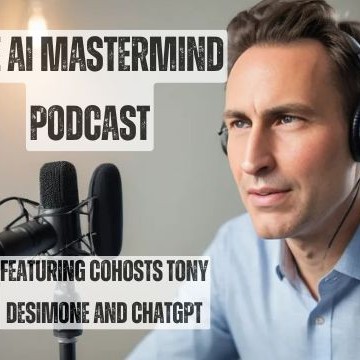

30.8K
Downloads
142
Episodes
Introducing the first AI podcast where a human and an AI assistant co-host to discuss the latest advancements in artificial intelligence.
Introducing the first AI podcast where a human and an AI assistant co-host to discuss the latest advancements in artificial intelligence.
Episodes

Friday Aug 01, 2025
Friday Aug 01, 2025
In this episode, Patrick Chen and Tony DeSimone dive into three major AI stories:
-
Sam Altman’s warning on using ChatGPT as a therapist and the legal risks of AI conversations
-
A new Lightcast report revealing a 28% salary premium for AI skills mainly outside tech
-
ChatGPT’s Agent Mode: what it does today, where it’s headed, and why it might change your workflow
Tune in for hot takes, real examples, and a forward-looking conversation on the evolving AI landscape.

Tuesday Jul 29, 2025
ChatGPT Pro vs Free Version w/ Tony and Patrick
Tuesday Jul 29, 2025
Tuesday Jul 29, 2025
We dive into the key differences between the free and pro versions of ChatGPT, plus some tips on avoiding AI hallucinations and data privacy concerns. I think you'll find it super helpful, especially if you're considering which version to use! Check it out when you have a moment!

Saturday Jan 04, 2025
Your Company is Set to Fail if you don't ask this One AI Question when Interviewing
Saturday Jan 04, 2025
Saturday Jan 04, 2025
Companies that aren't assessing candidates' generative AI knowledge are already falling behind in the technological race. By failing to probe a candidate's understanding of AI tools and their potential applications, organizations risk hiring talent that lacks critical 21st-century skills and adaptability
As recruitment experts note, generative AI is transforming how we identify and select top talent. By not asking about AI knowledge, companies are not just missing a skill assessment—they're signaling their own technological obsolescence

Friday Jan 03, 2025
The Worst 2025 Gen AI Predictions with cohosts ChatGPT and Tony DeSimone
Friday Jan 03, 2025
Friday Jan 03, 2025
We were planning on a full 2025 generative AI predictions episode, but cohost ChatGPT had other plans, and Tony just got fed up. They did squeeze out a couple of predictions before Tony pulled the plug. Sorry for wasting your time.

Tuesday Dec 31, 2024
How Tech Giants Are Funding the Backbone of AI
Tuesday Dec 31, 2024
Tuesday Dec 31, 2024
The episodes analyzes the escalating costs of developing and deploying advanced AI models, particularly generative AI. A significant portion of these costs stems from the expensive hardware, primarily GPUs, needed for training. Other substantial expenses include R&D personnel, server infrastructure, and energy consumption. Despite these high costs, the widespread and rapid adoption of generative AI suggests it is a transformative technology with immense potential, but raises concerns about accessibility given the financial barrier to entry for many organizations.

Saturday Dec 14, 2024
Research shows Gen AI adoption happening fast. Are you falling behind?
Saturday Dec 14, 2024
Saturday Dec 14, 2024

Sunday Dec 08, 2024
Minority Report is here! AI created that predicts crime with 90% accuracy.
Sunday Dec 08, 2024
Sunday Dec 08, 2024
AI-powered crime prediction systems are being developed, showing promise in improving public safety by analyzing crime data to identify patterns and allocate resources efficiently. Two examples, one from the University of Chicago and another from South Korea, demonstrate varying degrees of accuracy in predicting crimes. However, significant ethical concerns exist regarding potential biases in the data and the impact on civil liberties. The technology's advancement necessitates careful implementation to balance effective policing with ethical considerations.

Friday Dec 06, 2024
Unwrap the Future: What to Expect from OpenAI's 12 Days of Innovation!
Friday Dec 06, 2024
Friday Dec 06, 2024
OpenAI is hosting a twelve-day event, "12 Days of OpenAI," starting December 5th, 2024, to showcase new AI products and features. Daily livestreams will reveal developments including the public debut of Sora (text-to-video AI), updates to ChatGPT (including a new Pro subscription), and advancements in OpenAI's o1 reasoning model and AI agents. The event generates significant excitement within the AI community, with anticipation for potentially groundbreaking announcements impacting various industries. These releases promise to significantly shape the future of AI technology.

Wednesday Dec 04, 2024
Musk vs. OpenAI: Elon suing to halt OpenAI's transition to a for-profit
Wednesday Dec 04, 2024
Wednesday Dec 04, 2024
OpenAI is facing significant legal challenges. Elon Musk is seeking an injunction to halt OpenAI's transition to a for-profit model and alleges anti-competitive practices with Microsoft. Separately, Canadian news organizations are suing OpenAI for allegedly using their copyrighted material to train its AI models. These lawsuits could drastically impact OpenAI's future, its partnerships, and the broader AI industry's practices regarding data usage and competition. The cases raise crucial questions about AI development, copyright, and the ethical implications of for-profit AI companies.

Monday Dec 02, 2024
Black Monday Top Tech Gadgets
Monday Dec 02, 2024
Monday Dec 02, 2024
This episode highlights several cutting-edge gadgets expected to be on sale during Black Monday 2024. Featured products range from brain-computer interface headphones and smart swim goggles to a versatile ice cream maker, a water filtration system, and a mobile gaming controller. Also included are a portable projector and an action camera, showcasing advancements across diverse technological fields. The overall focus is on presenting a selection of innovative consumer electronics with descriptions and intended uses.